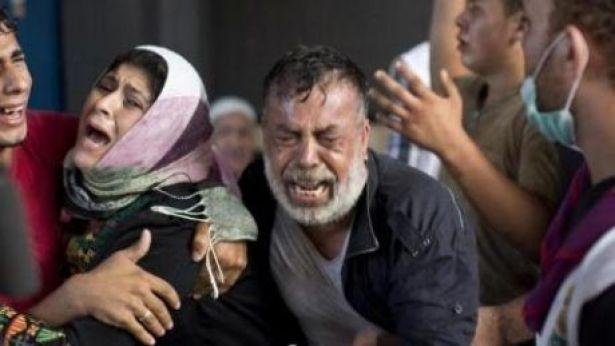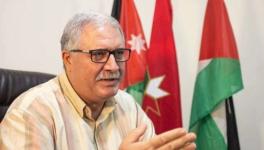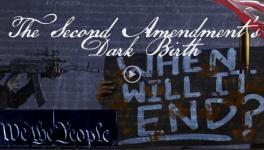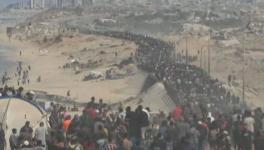War on Gaza will Strengthen Palestine as Both a State and a National Resistance
Israel's war on Gaza will not end with a cessation of hostilities, or even a ceasefire. Nor will it end with an armed struggle shorn of political context. Instead, argues Dr. Karim Makdisi a new, post-peace process period is being consolidated, this time with Israel on the back foot
Israel's war on Gaza will not end following the humanitarian pauses or an inevitable cessation of hostilities.
The United Nations will not forcefully assert the "just" settlement that its Security Council and General Assembly havebeen insisting upon for decades. Any Human Rights Council investigation of war crimes will likely be buried in the same drawer as the well-publicized Goldstone commission report followingIsrael's brutal invasion of 2008/9. There will be no UN protection force sent to Palestine to protect its civilians, enforce their political rights, and implement their right of return.

There will be no happy ending, and assuaging of guilt for liberal Europeans via a "two-state solution" in which they—and many of their organizations and NGOs—have invested so much, but that has effectively underwritten decades of occupation and enabledmassive corruption. Their protests against Israel's "disproportionate" responses in Gaza will not be backed up by serious accountability mechanisms or sanctions.
The US will not officially admit that its unqualified support for Israel and openly biased mediation enables colonization of Palestinian land, underwrites the occupation and siege of Gaza, negates Palestinian political and legal rights, directly contributes to the appalling humanitarian situation in Gaza, and ultimately harms its own interests and security.
The Saudis and Qataris will not end their rivalries to control the various Islamist groups and reformulated military regimes in and out of power at the expense of regional stability and unified Arab position on Palestine. The Egyptian military regime will not suddenly stop fencing in Gaza.
Israel will not emerge from this war in a better position politically or strategically. Its leaders will not be closer to abandoning their fantasy of an internationally recognized "Jewish State" imposing apartheid conditions on some Palestinians, and continuing ethnic cleansing and land grab policies on others. It will not immediately end the occupation or lift the Gaza siege in meaningful ways; it will not end its colonization of Palestinian land; and it will not accept its responsibilities under international law.
The Palestinian Authority (PA) of Mahmoud Abbas will probably not fully understand that its subservient position vis-à-vis Israelis in total disregard of the Palestinian people's overwhelming desire to live in dignity within a democratic polity. The PLO will not disband the PA despite the dismal failure of the Oslo process. It is unlikely that Hamas will now accept that Palestinians reject religious rule, or that women demand equal rights as citizens.
There is perhaps not much point in showing that Israel's justification for attacking Gaza on July 8 was typically flimsy (Hamas did not kidnap the three settlers); or that Hamas rockets into Israel had stopped for 18 months prior to Israel's latest invasion. There is also not much more to say about how the long occupation and siege of Gaza has rendered it the world's biggest prison with one of the poorest and most densely-populated lands; and that resisting this reality is a natural impulse, a responsibility in fact. There is no need either to point out that the majority of Palestinians living in Gaza were already refugees who were violently expelled from their homes and land in Palestine during and after the 1948 Nakba.
Nor is there much to gain from individually listing the names and showing the pictures of the nearly 2,000 dead—and many more thousands wounded, and hundreds of thousands traumatized—from this war on Gaza, or focusing on the anguish of their families and friends.
All this has been reported on television, news sites,blogs, Facebook, and Twitter. It has been meticulously detailed for the record by Palestinian human rights groups and the dedicated staff of the UN on the ground—whether OCHA (Office for the Coordination of Humanitarian Affairs) or UNRWA (UN Relief and Works Agency for Palestine Refugees) or one of the many other UN agencies working in Palestine.
What is necessary at this point is to think about three crucial points that we are left with, and that will frame the next stage of the conflict.
First, the idea of resistance, and a third Intifada, is now back on the table for Palestinians. In this sense, Gaza 2014 is less like the war on Gaza 2008/9, where Hamas offered little effective resistance, and more like Israel's war on Lebanon in 2006 that affirmed the success of a resistance discourse that could meaningfully challenge the empty rhetoric of 'peace process.' Hamas, to be sure, does not have the military capability, professional cadres, political sophistication, or the geographic and material advantages of Hizbullah in Lebanon. But this latest war has nevertheless enhanced the idea of a national Palestinian resistance beyond the military dimension, an idea that can accelerate the reconstitution of the Palestinian global body politic and calls for internal reform to face Israel.
Second, despite its valuable work in some social and humanitarian domains, the UN system has clearly failed, once again, in it responsibilities to protect Palestine's security, territorial integrity and the human rights and dignity of its people. During this Gaza war, the Security Council passed (so far) only one Presidential Statement (non-binding) on 28 July basically calling for a humanitarian pause, with no mention of lifting the siege or ending the occupation. The Secretary General, meanwhile, condemns 'both sides' as though somehow there is an equivalence between an occupying power killing nearly 2,000 civilians and an occupied resistance killing only 3 civilians. The UN, in effect, has at least since the early 1990s privatized and outsourced its political and legal role to the big powers. Indeed, one need only glance at the UN's emasculated role withinthe "Middle East Quartet"—comprising the UN, USA, EU, and Russia—to realize that on this level it provides a fig leaf for Israeli occupation and colonization within the framework of a now defunct, US-run 'peace process'.
The third point to keep in mind is that, as a result of the UN political failure, two other international avenues for addressing the Question of Palestine have become increasingly compelling. On the one hand lies the global civil society movement for boycott, divestment and sanctions of Israel ("BDS"); and on the other the recourse to international criminal courts to try individual Israelis for war crimes and/or crimes against humanity.
The BDS movement, which began in 2005 following a call to action by over 150 Palestinian civil society groups, has been steadily making headway in mainstream circles, as more academic, cultural and even celebrity support comes through.Stars such as Roger Waters, Javier Bardem, Penelope Cruz, John Cusak, Brian Eno; Nobel Prize winners such as Archbishop Desmond Tutu and Steven Hawking have made well-publicized statements in support of Palestinians. The Presbyterian Church in the US voted in June to divest from all companies that provide Israel with products that 'promote violence' to Palestinians, while most recently the American Studies Association and the Royal Institute of British Architects have added their institutional names to an increasingly long list. In short, BDS has become a leading global movement calling attention to Israel's apartheid system and advocating justice in Palestine. Israeli leaders are genuinely concerned about the impact this movement is having on de-legitimizing the Zionist project; and with every attack on Palestinians in Gaza and elsewhere this movement will grow.
The other path that will grow in importance is the pursuit of international criminal charges against Israelis. This was first seriously mooted following the war on Gaza in 2008-9, when, under international and local civil society pressure, the PA unilaterally recognized the jurisdiction of the Hague-based International Criminal Court (ICC) for acts committed on its territory. The then Prosecutor of the ICC, Louis Moreno-Ocampo, however took three years to finally decline to initiate such an investigation on the grounds that Palestine was not a 'state.' When the UN General Assembly voted overwhelming to upgrade Palestine in 2012 from a "non-member observer entity" to a "non-member observer state," it made Palestine eligible to repeat the same declaration and/or formally join the ICC.
Last week, the Palestinian Foreign Minister claimed that there was "clear evidence" that Israel committed war crimes; while PLO Executive Committee member HananAshrwai confirmed Palestine's intention to accede to the ICC convention. Whether or not the PA under Mahmoud Abbas will actually withstand pressure from the US, Israel and Europe to follow through on this remains to be seen. However, this path has now been clearly marked.
Israel's war on Gaza will not end with a cessation of hostilities, or even a ceasefire. Nor will it end with an armed struggle shorn of political context. Instead, a new, post-peace process period is being consolidated. Working within a more solid national framework of renewed resistance and political agency,Palestinians must continue to mobilize international sentiment, and explorecriminal proceedings to hold Israel accountable. These cannot be easily halted by Israel or its backers in the West within the UN system. It must, in other words, continue to win what Richard Falk has called the legitimacy war.
Dr. Karim Makdisi is Associate Professor of Political Studies and International Affairs at the American University of Beirut. Makdisi's recent research focus has included the politics of the United Nations in the Middle East; and he has published several articles in international academic journals. He has frequently been interviewed by international media. He tweets on international relations in the Middle East @KarimMakdisi.
Disclaimer: The views expressed here are the author's personal views, and do not necessarily represent the views of Newsclick
Get the latest reports & analysis with people's perspective on Protests, movements & deep analytical videos, discussions of the current affairs in your Telegram app. Subscribe to NewsClick's Telegram channel & get Real-Time updates on stories, as they get published on our website.
























